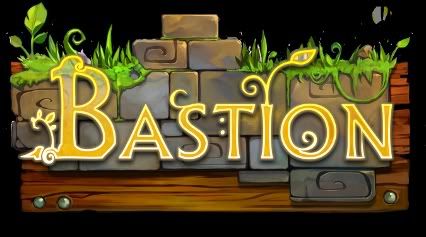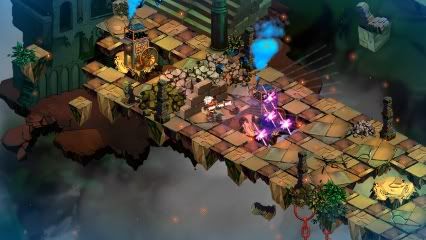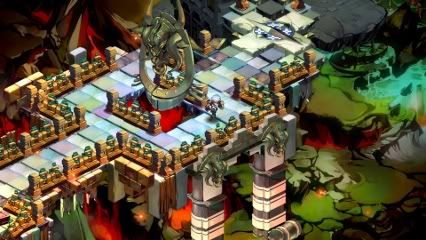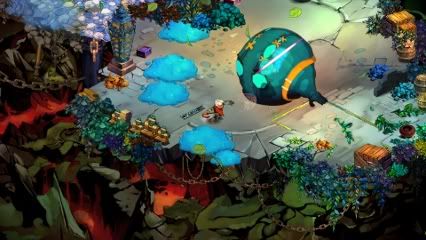
Having played through Bastion and come out the other end with a praiseful grin on our collective face, Critical Gamer accosted writer and level designer, Greg Kasavin, for a chat about Supergiant Games and their latest release.
Critical Gamer: Bastion is your first game, which means there’s a lot riding on it. Was it difficult balancing elements proven to be popular with the market with elements which would make Bastion and your studio stand out?
Greg Kasavin: It’s certainly the case that we as a studio have a lot riding on the success of Bastion. And we wouldn’t have it any other way. We left our jobs working for big publishers in order to be able to make games our way, and sink or swim based on the results of our own decisions. We all knew the stakes, being part of a small start-up company, and I think that pressure motivated us in a positive way — it kept us quick on our feet and hungry to make the most of our circumstances. In creating Bastion, all of us on the team pushed ourselves to do our absolute best work and make this game the best it could be. At the same time, the work was so rewarding and exciting that the effort felt very rewarding on the whole, even during the toughest times we faced.
Each member of the team was able to leave his or her mark on the game, even as we worked to make it feel like a cohesive whole, so in that sense we did not concern ourselves with trying to stand out from other games on the market just for the sake of it. Instead we focused on creating a complete-feeling experience that expressed our team’s collective feelings about gaming, and we believed the result of that effort would be something with its own clear identity.

CG: As a small team, do roles tend to overlap a lot or do members generally stick to their allotted tasks?
Greg: Our team is rather specialized overall, and there’s little overlap between the roles. For example, Darren Korb does all our audio including our music and sound effects and voice recording, while Jen Zee does all our artwork. Gavin Simon and Andrew Wang, our two engineers, split their responsibilities pretty cleanly with Gavin focusing on gameplay and tools and Andrew focusing on systems and core technology. Amir Rao and I collaborate on level design, but our roles differ a lot besides that — Amir does systems design and tuning and is also studio director, while I do all the writing and fiction. Last but not least we have Logan Cunningham our voice actor, whose performance is so essential to the experience of the game. Our culture is such that everyone tends to give feedback on everyone else’s work, and we’re all rather critical of and introspective about our own work, but having specialists in each domain I think leads to a strong sense of ownership and mutual respect.
CG: Do you have any desire to work on retail titles, and why?
Greg: Many of us used to work on retail games. Amir, Gavin, and I met while working on the Command & Conquer franchise for Electronic Arts, and Andrew worked at Infinity Ward on Modern Warfare and its sequel. So we’ve been there before. I’d be foolish to say it’s something I’d never want to do again under any circumstances, because once in a while there’s a truly amazing retail game that’s like nothing else out there. But we deliberately left making retail games in favor of making downloadable games because we saw more exciting opportunities here. We can work faster to make our own games, make the kinds of creative choices that would never be permissable at a large studio, and ultimately provide a better value to players out there — folks have remarked that Bastion has the quality and scope of a full retail title, but it’s available for just a fraction of the cost.
CG: Tell us about those wonderful graphics.
Greg: Our hand-painted 2D art style is the work of our art director Jen Zee, who joined the project at a point when we had a feel for the kind of tone we wanted even though the look of the game was still undefined. Jen was able to take those details and create a visual style that struck just the balance we realized we were looking for. We wanted the game to be visually striking, to have that transportive quality where you felt like you were in a different world while you were playing. And we wanted that world to have a lot of beauty in it, almost like you were exploring a storybook, some of it familiar and some exotic. But we also wanted an emotional weight to all of it, where you quickly realized that this world has suffered and lost so much. I think Jen’s work really captured all this nuance and complexity, in addition to just looking great. One thing we knew from the very beginning was that we wanted to make a 2D game, as we really miss the crisp and responsive feel of classic 2D games and think most of today’s 3D games still struggle to achieve that.

CG: That old-school isometric 3D would work great combined with a 3D display. Could we see Bastion, or perhaps some kind of spin-off, on the 3DS?
Greg: The only versions of Bastion that we’ve announced are the just-released Xbox 360 version and the PC version slated for later this year. Beyond that, it’s anyone’s guess as to what we do next! Our plans aren’t set in stone as yet and we don’t know what the future holds, especially since a lot will depend on how Bastion does for us. As a small team, we believe it’s in our and our players’ best interest for us to focus development on one version of the game at a time, so that we can make the best possible game each time. We’d love to be on every platform under the sun but want to make sure we put care and attention into any version of the game we put out there for people. So yeah, while I agree there’s some cool potential in seeing the world of our game on a 3D-capable platform like the 3DS, I can’t make any promises about something like that. We’re focused right now on supporting the 360 version of the game while wrapping development on PC.
CG: Where did the idea for a real-time narrator come from?
Greg: Like many of the specific ideas in Bastion, the real-time narration was something that came about during the course of around nine months of prototyping work. It was something Amir wanted to try, seeing as he was already working with Darren our audio director who was roommates with Logan, their mutual friend and an actor in New York. One day they recorded a few lines, and when Amir plugged them into the game, it really added a lot to the experience. The narration turned out to be a great way of delivering the story we wanted to tell because it solved some of the seemingly contradictory problems we were struggling with at the outset of the project: On one hand we wanted a game that could leave some sort of lasting impact through its use of narrative, but on the other, we did not want to interrupt the play experience for the sake of the story. Using narration we realized we could have the story unfold at the player’s own pace, and find opportunities to make it feel personal by reflecting on the player’s actions and choices.
CG: How many pages/hours of dialogue are there in Bastion?
Greg: We recorded something close to 3,000 lines of narration. I’m not exactly sure what the total running time of that content is but the game takes most players at least eight hours to play through and the narration is fairly steady throughout . We didn’t aim for any particular threshold, we just applied the narration everywhere we felt it enhanced the game, and we used it to tell an overarching story in addition to deepening the player’s experience in some of the optional areas. In fact we cut a lot of stuff along the way, and we were constantly rewriting, tuning, and re-recording in order to get the feel of it just right.

CG: Are there any specific games that inspired Bastion?
Greg: Really there are too many inspirational games to mention here and I’m hesitant to name specifics because it’s misleading to suggest that any one, or two, or five games were direct influences. Everyone on the team has been playing games pretty much their entire lives, so we each have a variety of past influences that have gone into this game, depending on whether you’re talking about specific aspects of the gameplay, or the look, or the narrative, or any aspect.
Our process wasn’t to look at specific games and assimilate their features, but rather to look at the central idea we had and incrementally add to it until we felt like the game was complete and fully delivered on the experience we had in mind. In so doing, we would always first try doing things we couldn’t think of from any other games, and when that inevitably failed half the time or so, we’d think of references from other games and look at what they did well. Some people see Bastion as sort of a throwback to the classic 16-bit era, which is an era of gaming I personally love a lot. But even though some of my favorite games from that era include stuff like Super Metroid and Chrono Trigger and Final Fantasy IV and VI, I don’t think there’s a lot of over similarity between Bastion and those games. Also we were spiritually inspired by some of the past successes from independent developers, everything from Braid to Castle Crashers to Plants vs. Zombies. While the cofounders of the studio and I were working at EA, we were seeing these high-quality, beautifully executed games created by small teams, and we started to imagine what it might be like to strike out on our own and follow in their footsteps.
CG: How does it feel to have your first game finally ready for download on XBLA?
Greg: It feels amazing! I’ve wanted to make games since I was a little kid playing Ultima games on the family Apple II computer. Bastion isn’t the first game I’ve had a chance to work on but it’s by far the most personal, not just for me but for all of us on the team. We were happy with how it turned out, all the more so now that we’ve heard from a lot of players who’ve played through it for themselves.







Comments